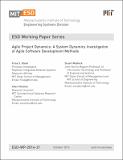| dc.contributor.author | Glaiel, Firas S. | |
| dc.contributor.author | Moulton, Allen | |
| dc.contributor.author | Madnick, Stuart E. | |
| dc.date.accessioned | 2016-06-06T23:51:11Z | |
| dc.date.available | 2016-06-06T23:51:11Z | |
| dc.date.issued | 2014-10 | |
| dc.identifier.uri | http://hdl.handle.net/1721.1/103024 | |
| dc.description.abstract | While Agile software development has many advocates, acceptance in the government and defense sectors has been limited. To address questions of meanings to the term “Agile,” we examine a range of Agile methods practiced and develop a framework of seven characteristics, which we call the Agile Genome. We gain insight into the dynamics of how Agile development compares to classic “waterfall” approaches by constructing a System Dynamics model for software projects. The Agile Project Dynamics (APD) model captures each of the Agile genes as a separate component of the model and allows experimentation with combinations of practices and management policies. Experimentation with the APD model is used to explore how different genes work in combination with one another to produce both positive and negative effects. The extensible design of the APD model provides the basis for further study of Agile methods and management practices. | en_US |
| dc.language.iso | en_US | en_US |
| dc.publisher | Massachusetts Institute of Technology. Engineering Systems Division | en_US |
| dc.relation.ispartofseries | ESD Working Papers;ESD-WP-2014-31 | |
| dc.title | Agile Project Dynamics: A System Dynamics Investigation of Agile Software Development Methods | en_US |
| dc.type | Working Paper | en_US |
